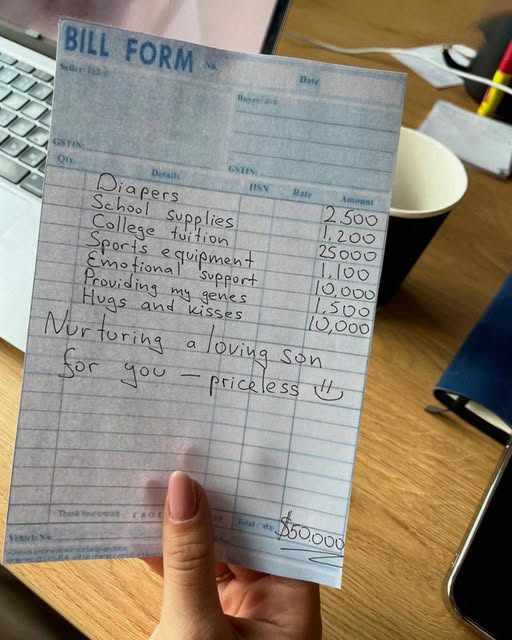The Invoice That Redefined Our Family Boundaries
I had expected our wedding anniversary to be simple and sweet—just dinner, cake, and a few shared laughs with family. But the evening took a jarring turn when my mother-in-law, Laura, handed me an envelope with a smug little grin. At first, I thought it might be a heartfelt card, maybe even one of her quirky jokes. I opened it without hesitation, expecting something sentimental.
What I found instead was an itemized bill.
Neatly typed, it listed the supposed costs of raising her son, Edward. There were line items for food, clothing, school supplies, and, shockingly, even “emotional support.” She had essentially tallied up the expenses of his childhood and handed them to me, as though I now owed her reimbursement for marrying her son.
I was stunned. Laura had always been controlling and critical, but this crossed a line I didn’t even know existed. More than absurd, it was insulting—an erasure of Edward’s painful reality growing up in her household. His childhood hadn’t been filled with warmth or guidance. Instead, it was marked by constant yelling, harsh punishments, and the kind of relentless criticism that leaves invisible scars. The man he is today—gentle, kind, and loving—is not a product of her parenting. He is the result of years of healing, of us working together to rebuild trust, empathy, and confidence.
The easy response would have been anger, maybe even a dramatic confrontation. But I knew that reacting with fury would only feed her narrative. Instead, I decided on something quieter, more powerful: a response that reflected both truth and grace.
I drafted my own invoice. This one didn’t itemize the cost of groceries or school uniforms. Instead, it documented the emotional toll of having Laura in my life. I listed the therapy sessions Edward had needed to undo years of damage. I added charges for the stress and anxiety caused by her constant stream of criticism. I included the emotional labor of teaching her son how to love freely, how to trust again, and how to silence the harsh inner voice she had planted in him.
And then, for good measure, I attached a particularly hefty fee for “teaching your son empathy and confidence.”
When the invoice was complete, I tucked it inside an envelope with a short, polite note. It read: “Respect, like love, cannot be bought—but it can be earned. Consider this a reminder.” I mailed it to her the next day.
Her response? Silence.
There was no dramatic outburst, no angry phone call, no attempt to justify herself. Just quiet. At the next family gathering, Laura was noticeably different. The barbed comments and unsolicited critiques that once peppered every interaction were absent. For the first time, she seemed tentative, even careful with her words. The smugness was gone, replaced with a wary kind of respect.
That anniversary envelope, which began as an insult, turned into something unexpected: a boundary drawn with dignity. It didn’t require shouting or bitterness—just clarity and self-respect. By answering her absurd bill with one of my own, I reminded Laura that relationships cannot be measured in dollars and cents, and that love is not a transaction.
It was, in its own way, a quiet victory. A small but powerful affirmation that standing up for oneself doesn’t always require confrontation. Sometimes, the most lasting lessons are taught with grace.


